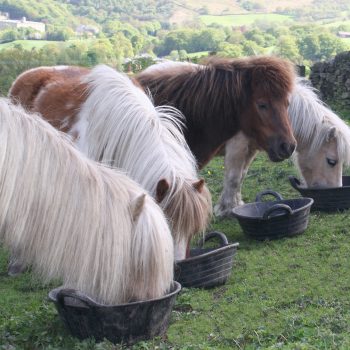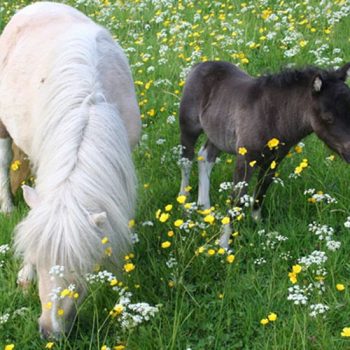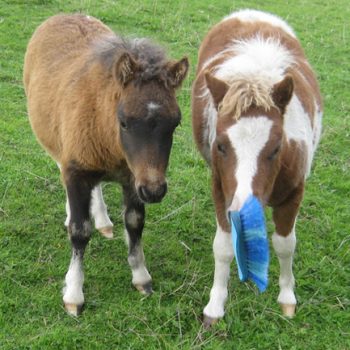Day to Day Care
How we look after our ponies



General Care
Being the native breed they are, Shetlands are very hardy ponies, who, after their first winter, can live out all year with just natural shelter/shade from the elements – trees, hedges, walls etc. An an open fronted shelter is useful, though the ponies often opt to stand outside anyway! We have stables for use for foals/foaling/illness though our shetlands are rarely sick or sorry. Some people rug their ponies in winter, we generally don’t as they have double winter coats which have guard hairs that shed rain and keep the pony’s skin dry. There are of course exceptions when, at times, a rug might be best for the pony’s welfare. We have a couple of rugs handy if needed and have found the Ruggles rugs fit well like the one we bought for our old lady Rosie below.
 All ponies have a good, well fenced paddock with sufficient clean grass – youngstock and brood mares needing more for growth and lactation. The field needs of course to be free of any hazards or poisonous plants with a clean, fresh water supply (regularly cleaned to remove any green “bloom”) and adequate space to exercise and play – size will depend on how good your land is/ drainage etc. some say half an acre per pony. We keep weeds down by spraying (obviously removing the ponies for at least the required time), removing any ragwort manually with a ragwort fork. It’s always useful to have the facility to rest fields to keep land in good condition. In our larger fields we sometimes use temporary electric fencing to manage the grazing. We do some poo picking which can help lessen worm problems, the extent you may need to do this will depend on how much land you have. There are of course many other factors to good grass management, eg checking ph levels etc which are too complex to cover here. We are fortunate given the increasing price of hay, to have the capacity to use some fields for hay production, preferring hay to haylage. We top fields as necessary in autumn, we are lucky to have an excellent local haymaker/ topper thanks Mark!
All ponies have a good, well fenced paddock with sufficient clean grass – youngstock and brood mares needing more for growth and lactation. The field needs of course to be free of any hazards or poisonous plants with a clean, fresh water supply (regularly cleaned to remove any green “bloom”) and adequate space to exercise and play – size will depend on how good your land is/ drainage etc. some say half an acre per pony. We keep weeds down by spraying (obviously removing the ponies for at least the required time), removing any ragwort manually with a ragwort fork. It’s always useful to have the facility to rest fields to keep land in good condition. In our larger fields we sometimes use temporary electric fencing to manage the grazing. We do some poo picking which can help lessen worm problems, the extent you may need to do this will depend on how much land you have. There are of course many other factors to good grass management, eg checking ph levels etc which are too complex to cover here. We are fortunate given the increasing price of hay, to have the capacity to use some fields for hay production, preferring hay to haylage. We top fields as necessary in autumn, we are lucky to have an excellent local haymaker/ topper thanks Mark!

Our ponies are routinely checked at least once a day. We aim to keep our ponies at a healthy weight and avoid any problems associated with excess weight such as laminitis. Any pony can of course develop laminitis, some are more prone than others but managing their grazing is an important factor.
We only generally stable ponies when they are foals, only at night during their first winter in severe weather in a box with another foal but mostly they have a field shelter they can go in and out of at will. Also mares close to foaling are stabled at night under CCTV so they can be observed. Otherwise, we find they love to be outdoors – bearing in mind all equines are grazing, roaming animals and we think boredom and vices can kick in when ponies are stabled for long periods.

Of course, there are occasional other times when a pony needs to be stabled, and if so, boredom breakers/ salt licks etc are invaluable – swedes on strings are favourites with our ponies. Our stables have lowered doors as aside so the ponies can see out, looking at 4 walls for hours on end is no fun.
Some foals will play with most things that appear in the field though I’m not sure you can offer these generally – one of our colts would often manage to toddle round the field with an ikea bag over his head!
Feet
We have a very good farrier who trims our pony’s feet on a regular basis. Some hooves grow quicker than others so it’s hard to say a definitive time scale, we tend to call our farrier when needed, unlikely to be more frequent than every 8 weeks.
Worming/ Injections

We use a weight tape to determine the amount of wormer needed, our ponies average around 175-200kg. Most wormers treat around 700kg so a tube of wormer will do up to 4 mini shetlands so only around £3 / pony. We tend to alternate Equest and Equimax as this has worked for us and covers all worm types including tapeworms, confirmed by worm count checks done intermittently (Westgate Labs are reasonable) they have always come back clear. You can opt to go on a special programme where you send off a sample for a worm count and they will send you an appropriate wormer as needed. We try and work in some worm counts so that wormers aren’t used unnecessarily given resistance to wormers. We usually buy online – Hyperdrug have proved reliable and competetively priced. We worm foals from 6 weeks of age using panacur paste as recommended by the National Foaling Bank.
Tetanus innoculations can be a good idea, but if you don’t opt for this routinely, your vet would often recommend it should your pony have an injury. Flu jabs are another option, your vet is the best person to advise you.
Grooming
Most Shetlands love being brushed and fussed but remember not to overdo it and remove the grease which keeps your pony dry and warm. We like to keep manes and tails tangle free and tend to cut tails above the ground before winter so they don’t damage them and drag them in the mud though don’t overdo it – a shown Shetland should have a long tail! We check ponies for lice – itching/ rubbing can be a sign. Louse powder or invermectin wormer can help. We have occasionally used Pig Oil on manes and tails to deter rubbing, lice don’t like greasy environments though thankfully we have only had the odd instance.
Travelling Ponies

Some of our ponies are used to travelling but of course if you buy a foal it won’t have travelled. If we know a pony has a long journey ahead (as the foals we sold to the Isle of Wight!) we will get them accustomed to going in a trailer – often letting them go in and eat so they feel comfortable in the trailer to lessen the stress of a long journey.
We would always travel foals, and other ponies who haven’t travelled before, loose as we feel it’s safer this way. Our trailer is specially adapted with full partitions so little feet etc cannot become trapped. Generally buyers will need to sort out travel arrangements for any pony they purchase. This year we bought a trailer mover from ebay – great purchase for backing a trailer into a small space, saves your clutch!
Our trailer has been modified and carries 3 shetlands with “shetland safe” partitions as aside.
Change of Ownership
Purchasers can transfer their ponies into their names by sending a transfer form to the Shetland Pony Stud Book Society together with the pony’s passport. We will provide this with our part completed, the purchaser is required to pay a transfer fee to the Society – currently £20.
visit us
Visitors are welcome but please contact us first.
- Kettlesnout, Ripponden, West Yorks. HX6 4PA
- andreamerri@yahoo.co.uk
- 01422 822888 or 07813130179
- Message us on facebook